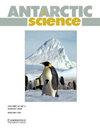讣告-伊夫·弗伦诺博士(1958–2022)
IF 2
4区 地球科学
Q3 ENVIRONMENTAL SCIENCES
引用次数: 0
摘要
伊夫·弗雷诺将被他在世界各地的朋友和同事深深怀念。他漫长而令人印象深刻的职业生涯为南极和亚南极的研究、合作和政策留下了实实在在的遗产。1982年至2004年间,伊夫参加了14次对法属亚南极岛屿(克罗泽岛、克格伦岛和阿姆斯特丹岛)的考察,包括在克罗泽岛的一个冬天,以及对斯匹次卑尔根岛和赫德岛的考察。他还作为法国保罗-埃米尔·维克托研究所(IPEV)所长三次航行到德蒙特·居维尔站。2018年,在新“星盘号”首航返航时,伊夫被授予法国荣誉勋章。伊夫在亚南极的许多方面都是多产的出版商,发表了超过65篇科学出版物和大量报告,会议演讲和科普传播,主题包括陆地生物多样性(植物,动物,土壤,生态生理学),气候变化的影响,冰川退缩后的初级演替和入侵物种的动态。从1989年到2003年,伊夫在国家队和国际国家队执教。1994年至2002年,伊夫在法国雷恩大学生态研究部(法国国家科学研究中心6553)担任“派庞特生物研究站”副主任,并领导了“气候变化影响”研究小组。在20世纪90年代中期,他领导了由法国极地IPEV支持的“生物土壤”研究项目,重点研究土壤和陆地动植物。伊夫热衷于研究和保护极端环境下的生物多样性。他与Thierry Micol, Pierre jouvenn和vsamronique Sarrano合作,产生了开创性的综合研究,为法国南部领土(Kerguelen, Crozet, Saint Paul和Amsterdam islands)提供了保护(自然保护区Terres Australes franaisises)。doi: 10.1017 / S0954102022000189本文章由计算机程序翻译,如有差异,请以英文原文为准。
Obituary – Dr Yves Frenot (1958–2022)
Yves Frenot will be greatly missed by his friends and colleagues around the world. His long and impressive career has left a tangible legacy in Antarctic and sub-Antarctic research, collaboration and policy. Yves participated in 14 expeditions to the French sub-Antarctic islands (Crozet, Kerguelen and Amsterdam islands) between 1982 and 2004, including a winter on Crozet Island, as well as expeditions to Spitsbergen and Heard Island. He also voyaged to Durmont d'Urville station three times in his role as Director of Institut Polaire Français Paul-Emile Victor (IPEV). In 2018, on board the maiden return voyage of the new L'Astrolabe, Yves was awarded the French Order of Merit. Yves was a prolific publisher on many aspects of the sub-Antarctic, with over 65 scientific publications and numerous reports, conference presentations and popular science communications covering topics such as terrestrial biodiversity (plants, animals, soils, ecophysiology), the impacts of climate change, primary succession after glacial retreat and the dynamics of invasive species. From 1989 to 2003, Yves managed teams at both the national and international level. At the EcoBio department (UMR (Unité Mixte de Recherche) CNRS (Centre National de la Recherche Scientifique) 6553, Rennes), Yves was the deputy director of the 'Station Biologique de Paimpont' from 1994 to 2002, and he also led the research group 'Impact of climate change' (UMR EcoBio). In the mid-1990s, he led the 'Biosol' research project, which was supported by the French Polar IPEV and focused on the study of soils and terrestrial fauna and flora. Yves was passionate about researching and protecting biodiversity in extreme environments. His collaboration with Thierry Micol, Pierre Jouventin and Véronique Sarrano produced a ground-breaking synthesis of research that led to protection (Nature Reserve Terres Australes Françaises) for the French Southern Territories (Kerguelen, Crozet, Saint Paul and Amsterdam islands). doi:10.1017/S0954102022000189
求助全文
通过发布文献求助,成功后即可免费获取论文全文。
去求助
来源期刊

Antarctic Science
地学-地球科学综合
CiteScore
3.60
自引率
6.20%
发文量
42
审稿时长
3 months
期刊介绍:
Antarctic Science provides a truly international forum for the broad spread of studies that increasingly characterise scientific research in the Antarctic. Whilst emphasising interdisciplinary work, the journal publishes papers from environmental management to biodiversity, from volcanoes to icebergs, and from oceanography to the upper atmosphere. No other journal covers such a wide range of Antarctic scientific studies. The journal attracts papers from all countries currently undertaking Antarctic research. It publishes both review and data papers with no limits on length, two-page short notes on technical developments and recent discoveries, and book reviews. These, together with an editorial discussing broader aspects of science, provide a rich and varied mixture of items to interest researchers in all areas of science. There are no page charges, or charges for colour, to authors publishing in the Journal. One issue each year is normally devoted to a specific theme or papers from a major meeting.
 求助内容:
求助内容: 应助结果提醒方式:
应助结果提醒方式:


